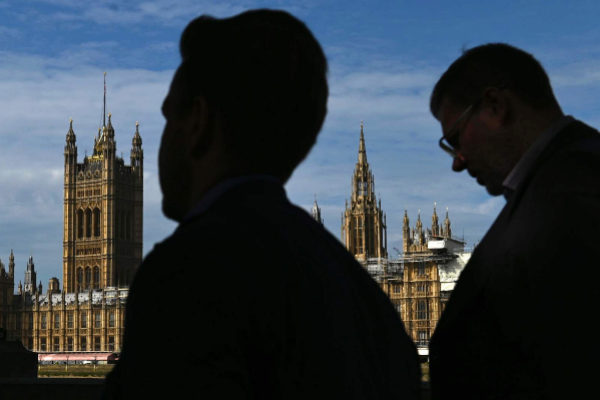- Brexit.Boris Johnson asks the Queen to suspend Parliament until October 14
- Markets. The pound reacts with a sharp collapse to the possible suspension of Parliament
"We do not comment on the internal political processes of our Member States," the European Commission has reacted, in the words of its spokesman Mina Andreeva, to the announcement by British Prime Minister Boris Johnson of his intention to suspend the session of Parliament - plan already accepted by the Queen Elizabeth II-, scheduled for next week, presumably to avoid a brake on her plan to leave the EU on October 31, with or without agreement.
Who has spoken, and with great hardness, has been the coordinator for the Brexit of the European Parliament Guy Verhofstadt: "Take back control", said in reference to the slogan of the defenders of Brexit, " never seemed so sinister ." Verhofstadt has shown his solidarity with his parliamentary colleagues who are "fighting to have their voices heard."
In addition, after confirming that the British Parliament will not meet again until next October 14, the president of the Eurocamara, David Sassoli, reacted to the news. "Listening to parliaments is always good in democracy. For this it is better to keep them open (in reference to parliaments)," he tweeted sarcastically.
A few months ago, during a press conference, Jean-Claude Juncker acknowledged the biggest mistake of his mandate as president of the European Commission was to remain silent during the referendum campaign that led to the UK's departure from the EU. And yet, silence has returned to Brussels, which refuses to assess Johnson's decision to suspend Parliament. The Executive looks the other way in the British institutional crisis and avoids commenting on the possible consequences for a potential agreement on Brexit.
The announcement coincides with the arrival in Brussels of David Frost, a UK negotiator for Brexit, following Johnson's round of contacts with several European leaders in recent days. Frost meets with members of the negotiating team of the Brexit Commission, known as the 'task force', and Juncker's chief of staff, Clara Martínez, to continue the technical dialogue. "Our negotiators will listen to what the United Kingdom has to say and will engage in a constructive conversation about any proposal they may have and that is compatible with the exit agreement," Andreeva said.
For now, the talks will remain technical, not political. The chief negotiators of both sides, Michel Barnier for the EU and Steve Barclay for Downing Street, have spoken several times over the phone but have not yet met. Nor Johnson and Juncker. Both leaders talked yesterday afternoon and will keep in touch in the coming days.
During his conversation, the president of the Commission showed again the will of the EU to find solutions to end the blockade in the negotiation. Juncker did not mention it, but it refers to the Irish safeguard, known as 'backstop' in Brussels jargon. The president of the Commission insisted on any solution must respect the exit agreement, which London and the 27 signed in November 2018, and insisted on "firm" support for Ireland and its interests.
The European Commission works on the hypothesis that the United Kingdom will leave the EU on October 31 with an agreement. "For that to happen, the sooner we see feasible proposals, the better," said Andreeva. During his telephone conversation, Juncker warned Johnson that the Union will do its best to avoid a scenario without agreement but "if a non-agreement were to occur, it would always be the decision of the United Kingdom, not the EU," he said.
According to the criteria of The Trust Project
Know more- European Comission
- Jean-Claude Juncker
- London
- Boris johnson
Macroeconomics The fall of the pound shakes Johnson's hard Brexit
European Union Emmanuel Macron warns Boris Johnson that there is no time for "a new agreement"
BrexitThe European Union to Boris Johnson: "Opposing the Irish safeguard is supporting a hard border in Ireland"

